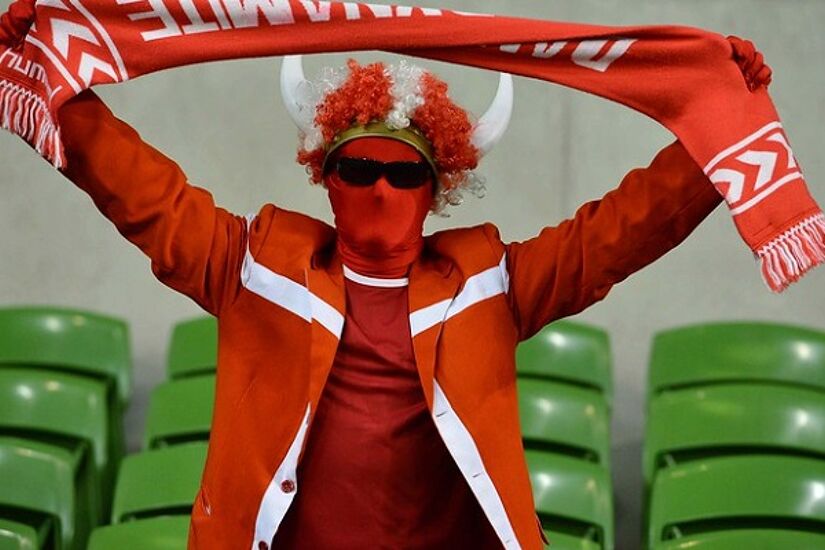On this Dane in history - five classic encounters between the Republic of Ireland and Denmark

Credit: Paul Dolan (ETPhotos)
Among the many contributions of Frank Sidebottom (aka the late Chris Sievey) to the canon of music about the beautiful game, the chant of “nil-nil, nil-nil…” to the tune of Amazing Grace doesn’t even rank near the top.
If it did, though, it might well be the best song ever written about the age-old Denmark v the Republic of Ireland fixture, which isn’t actually age-old either, dating only back to 1956.
Three of the last four meetings between Ireland and Denmark have ended in dour 0-0 draws, including the last two games in Denmark.
The first leg of the World Cup 2018 play-off at tonight’s venue, Parken Stadium, finished scoreless, as did both of the UEFA Nations League meetings last year.
The last of those meetings was enough to do for Martin O’Neill tenure as manager, a bottom-placed finish and relegation for League B the last straw regardless of O’Neill’s satisfaction with the result.
Those three results are unusual outliers in this fixture and the sides had experienced just one scoreless draw in their previous 13 meetings,
It’s generally been a fixture that has produced goals and, in the spirit of free-flowing attacking football, we’ve decided to look back at five notable games between the sides.
November 14th, 2017: Republic of Ireland 1 – 5 Denmark (Aviva Stadium)
Many of us would prefer to forget the nadir of the O’Neill era, a profound dip from the euphoria of Lille and Euro 2016 and particularly on the 1-0 win over world champions Germany two years earlier.
Things looked oh so good for the Boys in Green when Shane Duffy got on the end of Robbie Brady’s free kick and sent a looping header over the stranded Kasper Schmeichel.
Ireland appeared to take confidence from the early goal and, despite Denmark dominated possession through the elusive Christian Eriksen, they had chances to add to their lead.
Daryl Murphy turned Cyrus Christie’s cross just over the bar and James McClean passed up a glorious chance on the break when sent through by Brady, but he flashed his shot wastefully across goal.
Denmark equalised just before the half-hour as Ireland were slow to react to a short corner and Pione Sisto’s cross was turned into his own net by Christie.
Then began the Eriksen show, the Real Madrid target making it 2-1 two minutes later as he thumped Martin Jorgensen’s pass in off the bar.
Sisto set up Eriksen for the third just past the hour mark, and the Tottenham Hotspur playmaker sealed his hat-trick with another spectacular finish before Nicklas Bendtner added a late penalty.
Denmark marched onto the World Cup finals in Russia, where they came second in a group containing the eventual champions France, going out on penalties to finalists Croatia.
Read Gerard Grimes' match report here.
22nd August, 2007: Denmark 0 – 4 Republic of Ireland (Aarhus Stadion)A slight hint of optimism surrounded the Irish team as the stuttering start to the Euro 2008 qualifying campaign had largely been turned around.
Ireland were unbeaten at Croke Park, beat Wales and Slovakia in back-to-back qualifiers, while the summer tour to the US had seen prospects like Joe Lapira and Joe O’Cearuill handed debuts.
The Staunton days were never particularly short of goals, particularly if you were a Cypriot striker; in fact, this fixture could learn a thing or two from Staunton, who only had one 0-0 draw in his tenure.
In Aarhus, Staunton handed a debut to Darron Gibson off the bench while Darren Potter, one of the class of the US tour, made a surprise start in midfield.
It seemed to work as Ireland raced into a 2-0 lead by half-time, Robbie Keane netting from a defence-splitting Andy Reid pass to give Ireland the lead against the run of play.
Keane netted his second in somewhat fortuitous circumstances, when Jesper Christiansen went to punch clear an Aiden McGeady cross and it deflected in off the unwitting striker’s back.
Gibson and Shane Long were among the changes at the break and they were both involved in the third goal, Christiansen spilling Gibson’s rocket into the Tipp man’s path.
Nicklas Bendtner hit the post twice for the frustrated Danes, but it was Long who would add the final flourish as he steered home his second to seal a 4-0 win.
Within two months, following a 1-1 home draw against Cyprus, Staunton was out of a job and the path was clear for one Giovanni Trapattoni to enter the world of Irish football.
28th April, 1993: Republic of Ireland 1 – 1 Denmark (Lansdowne Road)
Ask any Irish football fan of a certain age and the name Kim Vilfort will likely provoke a smile of some description.
The Danish team that arrived at Lansdowne Road under the stewardship of Richard Moller Nielsen were European superstars.
Denmark were last-minute substitutes for the 1992 European Championships in Sweden after Yugoslavia were thrown out due to geopolitical issues.
They took full advantage as a team containing past and future stars like Peter Schmeichel and Brian Laudrup (but not Barcelona’s Michael Laudrup, who opted not to travel) beat Germany in the final.
Vilfort was one of the goalscorers in that final, and he opened the scoring midway through the first half when he lifted a delicate chip over the retreating Packie Bonner.
Both teams were unbeaten going into the game and a draw would have left the sides first and second but, having already beaten Spain, the European champions were bullish.
They didn’t reckon with Quinn, however, the lanky striker rising highest to guide a header into the corner to earn Ireland a precious point.
That goal proved to be crucial as Denmark, who had gone into the final day on top, were beaten by Spain and Jack Charlton’s side took second spot on goal difference behind the triumphant Spanish.
13th November, 1985: Republic of Ireland 1 – 4 Denmark
Virtually 32 years to the day before Ireland’s 5-1 humiliation to Age Hareide’s team, a 4-1 defeat at Lansdowne Road to a young and exciting Danish side proved to be the ending of Eoin Hand.
Despite drawing a tough group containing the Soviet Union, Denmark and Switzerland, Ireland were bullish heading into the 1986 World Cup qualifiers after controversially missing out on 1982.
A 1-0 win at home to the Soviets in the first game, courtesy of Mickey Walsh’s second-half strike, got Ireland off to the ideal start, but that was as good as it was to get for Hand.
Back-to-back defeats away to Norway and Denmark derailed the campaign before a 2-0 defeat at Central Lenin Stadium in Moscow ended any faint hope of qualification.
Denmark arrived at Lansdowne Road on the final day requiring a point to ensure qualification as group winners, having hammered Norway 5-1 in Oslo the previous month.
The Danes made short work of Ireland in front of a poor crowd of just 12,000, which perhaps represented the low level of confidence in Hand’s regime by then.
Despite taking a surprise sixth-minute lead through Frank Stapleton, Denmark were level inside 60 seconds as Preben Elkjaer beat Bonner.
Michael Laudrup put the Danes in front four minutes into the second half before John Sivebeak made it 3-1 just before the hour, and Elkjaer added the killer fourth 14 minutes from time.
Hand was removed from his post shortly afterwards and in his place was appointed Jackie Charlton, and a new era of Irish football began.
24th May, 1978: Denmark 3 – 3 Republic of Ireland
The Republic of Ireland were without an away competitive win in 11 years when John Giles took his side to Copenhagen in the opening game of the 1980 European Championship qualifying campaign.
Ireland got off to a flier and led 2-0 just past the midway point thanks to goals from Frank Stapleton and Tony Grealish.
Henning Jensen pulled a goal back just past the half-hour but Ireland went into the sheds at half time with a 2-1 lead.
That lead became 3-1 midway through the second half as Gerry Daly looked to have all but wrapped up a morale-boosting win away from home.
However Benny Nielsen pulled one back from the spot 11 minutes from time and Soren Lerby equalised 60 seconds later as Denmark stole a point.
Ireland would get some measure of payback in the home leg, winning 2-0 thanks to goals from Daly and Don Givens, but it was to be Ireland’s only win of the campaign.
Giles stood down at the end of the campaign and was replaced by Eoin Hand, who had his own jousts with the Danes, as detailed above.

